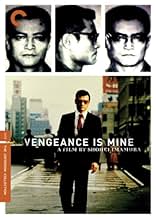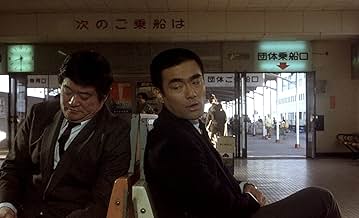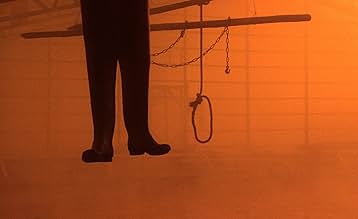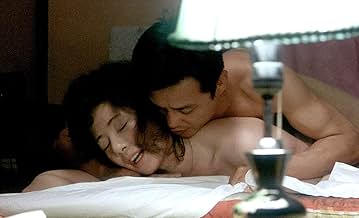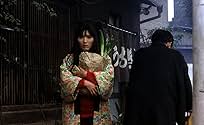IMDb RATING
7.7/10
7.8K
YOUR RATING
Chronological exploits of Iwao Enokizu, a murderous thief on the run.Chronological exploits of Iwao Enokizu, a murderous thief on the run.Chronological exploits of Iwao Enokizu, a murderous thief on the run.
- Director
- Writers
- Stars
- Awards
- 21 wins & 6 nominations total
- Director
- Writers
- All cast & crew
- Production, box office & more at IMDbPro
Featured reviews
'Vengeance Is Mine' is one of the best movies I've watched in a long time. I know there is a growing cult surrounding Imamura ('The Pornographers'), but I'm still extremely surprised that this movie isn't better known and discussed more. For many movie fans Japanese cinema either equals Kurosawa and Ozu if you're highbrow, and Godzilla and Mothra if you aren't, but both these simplistic approaches marginalize all kinds of fascinating and exciting movies from Suzuki's 'Tokyo Drifter' and 'Branded To Kill' in the 1960s, 'Vengeance Is Mine' and Oshima's 'In The Realm Of The Senses' in the 1970s, on to such contemporary innovators as Shinya Tsukamoto ('Tetsuo'), Beat Takeshi ('Hana-bi'), Takashi Ishii ('Gonin'), and Takashi Miike ('Ichi The Killer'). 'Vengeance Is Mine' is easily the most interesting serial killer movie I've ever seen. The narrative structure can be a bit confusing at first, and that combined with Imamura's non-judgmental approach might throw some viewers for a while, but if you persevere you won't regret it. Ken Ogata gives an impressive performance and the movie as a whole is utterly brilliant. I watched it twice to try and fully appreciate it, and I would now rate it as one of the very best movies of the 1970s (my favourite movie decade). This beautiful and disturbing movie comes with my highest recommendation!
Vengeance Is Mine marked Shôhei Imamura's return to fiction filmmaking after a decade spent working on documentaries. It is based on the true case of Nishiguchi, a Japanese criminal who eluded police for 78 days while committing five murders. The novel from which the screenplay was taken changed the name of the anti-hero to Iwao Enokizu and fictionalized real events. By providing a 'halfway house' between complete invention and real crime reporting, the source thus gave Imamura an ideal stepping-stone back into feature films: retaining the support of documentary inspiration whilst allowing the director to bring his personal vision and structuring to the events unfolding on screen.
Modern viewers are long used to a diet of slaughterer cinema, whether it be the Eileen Wuornos depicted in Monster, Albert Fish of The Grey Man, or much less illustrious fodder as Bundy, and Ed Gein. But even after 25 years, Vengeance Is Mine remains one of the few outstanding mass-murderer screen biographies. Told through a series of flashbacks, Imamura's film suggests by its structure both the disassociations of a killer's mind as well as reducing any empathy between creator and lead figure.
Thus we see Enokizu's story in five different time periods or points of view: first, during his final arrest and in police custody; then during the police investigation itself; while the killer is committing his crimes and escaping from the law; fourthly, his life before his crimes. Finally there's a scene or two occurring after the execution.
By recounting the various stages in a killer's life in non-linear fashion, interesting juxtapositions are possible, all the while dramatic tension between crimes is disrupted. We know that the murderer will have his way and the opening shows us he has been caught. The script's treatment of the material means suspense is removed from events, instead placed at a psychological level, i.e. not on how Enokizu builds to a killing and, presumably, hopes to get away with it, but why he does.
But as critic Alex Cox has said: "there are no easy answers" found in a movie much more oblique in its presentation than Hollywood might attempt. Indeed, for the most part, Enokizu's crimes seem to have no overwhelming motive at all (apart from the need for survival money), although deep at the heart of his compulsive behaviour is his bitter relationship with his father. And as Cox further observes, although Vengeance Is Mine headlines a biblical source, ("vengeance is mine, I shall repay sayeth the Lord") it is not absolutely clear in the film on who, or what, Enoziku is wreaking vengeance on.
If providence is interested in exacting justice by turn, bringing a necessary come-uppance, its mainly represented by two or three shots over the course of a film, suggestive of a hangman's noose - much more man's law than heavenly retribution. This, while Enokizu is caught and punished, such critical moments (commonplace set pieces in such western killer-centered films such as In Cold Blood) are not even shown. Vengeance Is Mine leaves precise moments of apprehension and execution to our imagination. Instead it shifts focus onto a fractured criminal career of mayhem, familial confusion, and casual sex.
Enoziku's father, Shizuo, is a complicated figure who stands as much at the centre of the narrative as does his son. Shamed during the war by refusing to stand up to the requisitioning authorities (a traumatic event witnessed by his son) he later develops a close relationship with Enokizu's wife. Although we presume not consummated, this attraction is a continuing source of great friction. But as Shizuo admits, another tie binds them as: "the blood of the devil runs in my blood too." At the end of the film it is left to Shizuo, a Catholic, to feel the guilt his son never expresses, and undergo excommunication as he arranges to be buried away from his wife in final penance. Critics have argued that Enoziku's murderous career is ultimately inspired by a lack of ability to kill his own father, and this failure is what motivates in turn his rage against others. Shizuo certainly recognises this weakness in murder during a final confrontation between the two, and it represents Enoziku's only regret.
With many of its characters drawn from the working classes and a preoccupation with sex, Vengeance Is Mine is a film entirely characteristic of its director, even after a decade long hiatus in his feature career. Like Mizoguichi before him, he often concerned himself with fallen or distressed women in his movies and here they are, represented once again. Imamura had also been a black marketeer in his early years, and was quite at home depicting the underbelly of society, whether it be the sleazy family inn at which Enoziku finds himself, the casual nature of the call-girls brought to its door or the fact that grandmother (herself a killer) watches intimate proceedings through a peep-hole.
Enoziku adapts the identity of a university professor during his stay at the inn, and elsewhere a lawyer (filching thereby an amount of money saved for a parole payment). Both outwardly upstanding and hunted at the same time, the criminal hides his culpability beneath a respectable façade. As with the rest of the film, the director's distancing allows no judgement on this state of affairs, merely showing Enoziku's illusion as convincing. Instead it leaves the anti-hero and his actions in a limbo, dependent on our own moral standpoint. Like the murderer's bones, thrown into the sky at the close, matters are suspended between heaven and hell, requiring further investigation.
Modern viewers are long used to a diet of slaughterer cinema, whether it be the Eileen Wuornos depicted in Monster, Albert Fish of The Grey Man, or much less illustrious fodder as Bundy, and Ed Gein. But even after 25 years, Vengeance Is Mine remains one of the few outstanding mass-murderer screen biographies. Told through a series of flashbacks, Imamura's film suggests by its structure both the disassociations of a killer's mind as well as reducing any empathy between creator and lead figure.
Thus we see Enokizu's story in five different time periods or points of view: first, during his final arrest and in police custody; then during the police investigation itself; while the killer is committing his crimes and escaping from the law; fourthly, his life before his crimes. Finally there's a scene or two occurring after the execution.
By recounting the various stages in a killer's life in non-linear fashion, interesting juxtapositions are possible, all the while dramatic tension between crimes is disrupted. We know that the murderer will have his way and the opening shows us he has been caught. The script's treatment of the material means suspense is removed from events, instead placed at a psychological level, i.e. not on how Enokizu builds to a killing and, presumably, hopes to get away with it, but why he does.
But as critic Alex Cox has said: "there are no easy answers" found in a movie much more oblique in its presentation than Hollywood might attempt. Indeed, for the most part, Enokizu's crimes seem to have no overwhelming motive at all (apart from the need for survival money), although deep at the heart of his compulsive behaviour is his bitter relationship with his father. And as Cox further observes, although Vengeance Is Mine headlines a biblical source, ("vengeance is mine, I shall repay sayeth the Lord") it is not absolutely clear in the film on who, or what, Enoziku is wreaking vengeance on.
If providence is interested in exacting justice by turn, bringing a necessary come-uppance, its mainly represented by two or three shots over the course of a film, suggestive of a hangman's noose - much more man's law than heavenly retribution. This, while Enokizu is caught and punished, such critical moments (commonplace set pieces in such western killer-centered films such as In Cold Blood) are not even shown. Vengeance Is Mine leaves precise moments of apprehension and execution to our imagination. Instead it shifts focus onto a fractured criminal career of mayhem, familial confusion, and casual sex.
Enoziku's father, Shizuo, is a complicated figure who stands as much at the centre of the narrative as does his son. Shamed during the war by refusing to stand up to the requisitioning authorities (a traumatic event witnessed by his son) he later develops a close relationship with Enokizu's wife. Although we presume not consummated, this attraction is a continuing source of great friction. But as Shizuo admits, another tie binds them as: "the blood of the devil runs in my blood too." At the end of the film it is left to Shizuo, a Catholic, to feel the guilt his son never expresses, and undergo excommunication as he arranges to be buried away from his wife in final penance. Critics have argued that Enoziku's murderous career is ultimately inspired by a lack of ability to kill his own father, and this failure is what motivates in turn his rage against others. Shizuo certainly recognises this weakness in murder during a final confrontation between the two, and it represents Enoziku's only regret.
With many of its characters drawn from the working classes and a preoccupation with sex, Vengeance Is Mine is a film entirely characteristic of its director, even after a decade long hiatus in his feature career. Like Mizoguichi before him, he often concerned himself with fallen or distressed women in his movies and here they are, represented once again. Imamura had also been a black marketeer in his early years, and was quite at home depicting the underbelly of society, whether it be the sleazy family inn at which Enoziku finds himself, the casual nature of the call-girls brought to its door or the fact that grandmother (herself a killer) watches intimate proceedings through a peep-hole.
Enoziku adapts the identity of a university professor during his stay at the inn, and elsewhere a lawyer (filching thereby an amount of money saved for a parole payment). Both outwardly upstanding and hunted at the same time, the criminal hides his culpability beneath a respectable façade. As with the rest of the film, the director's distancing allows no judgement on this state of affairs, merely showing Enoziku's illusion as convincing. Instead it leaves the anti-hero and his actions in a limbo, dependent on our own moral standpoint. Like the murderer's bones, thrown into the sky at the close, matters are suspended between heaven and hell, requiring further investigation.
Far from a film that explores the "whydunit?" of a ruthless but charming murderer, Vengeance of Mine bristles with all the energies Imamura believes the real Japanese possess. These people are in lower social positions and just trying to survive the brutality of day-to-day struggles. In their energy, courage, and perseverance to survive, Vengeance of Mine becomes beautiful and captivating to watch.
Admittedly, it is quite difficult to understand such stereotypes as murderer, tempted Catholic, prostitute, pimp/hotel owners, and delivery men as eccentric individuals in the space of two hours. But oddly enough, I feel a strange sense of familiarity in the hustle and bustle of these characters in the story. They may live their lives teetering on what is considered socially acceptable or healthful, but Imamura presents them with such respect and curiosity (of an anthropologist?!) - that I cannot resist feeling their robust lives leaping off the screen. In this way their seemingly bizzare and extreme behavior are very convincing, very real, and very touching.
Highly recommended for the challenging story (flashbacks, vignettes, illogical twists and turns of story and visual), quirky pace, idyllic country scenes, and the wonderful performance of Ken Ogata.
Admittedly, it is quite difficult to understand such stereotypes as murderer, tempted Catholic, prostitute, pimp/hotel owners, and delivery men as eccentric individuals in the space of two hours. But oddly enough, I feel a strange sense of familiarity in the hustle and bustle of these characters in the story. They may live their lives teetering on what is considered socially acceptable or healthful, but Imamura presents them with such respect and curiosity (of an anthropologist?!) - that I cannot resist feeling their robust lives leaping off the screen. In this way their seemingly bizzare and extreme behavior are very convincing, very real, and very touching.
Highly recommended for the challenging story (flashbacks, vignettes, illogical twists and turns of story and visual), quirky pace, idyllic country scenes, and the wonderful performance of Ken Ogata.
Immamura Shohei, one of Japan's best directors, does not put a foot wrong in VENGEANCE IS MINE, one of the best films ever made.
This is a searing, raw, uncompromising study of a disturbed, callous, opportunistic killer, husband and son.
The film, running just over two hours, takes an almost doco-style approach to the crimes of its protagonist (played with chilling conviction by Ken Ogata) and takes great pains to examine the impact his behavior had on his mother, father and wife.
A flashback, which goes some way towards explaining how Ogata developed such a disdain for authority, is a masterstroke of cinematic brevity.
Although Immamura is known mostly for such brilliant work as THE PORNOGRAPHERS, BLACK RAIN and the excellent THE EEL, this is surely his crowning achievement, a film so rich and involving that it personifies everything that is so amazing about Japanese cinema, truly a cinema of the soul.
This is a searing, raw, uncompromising study of a disturbed, callous, opportunistic killer, husband and son.
The film, running just over two hours, takes an almost doco-style approach to the crimes of its protagonist (played with chilling conviction by Ken Ogata) and takes great pains to examine the impact his behavior had on his mother, father and wife.
A flashback, which goes some way towards explaining how Ogata developed such a disdain for authority, is a masterstroke of cinematic brevity.
Although Immamura is known mostly for such brilliant work as THE PORNOGRAPHERS, BLACK RAIN and the excellent THE EEL, this is surely his crowning achievement, a film so rich and involving that it personifies everything that is so amazing about Japanese cinema, truly a cinema of the soul.
Shohei Imamura's multi award winning film Vengeance is Mine follows after the dismal performance of The Profound Desire of the Gods, this time being a film that is more accessible. Based on a novel which follows the life of crime of real-life criminal Iwao Enokizu (played by Ken Ogata), at one time the most wanted man in Japan for his series of murders, this was probably my favourite movie today, until I watched Imamura's Palme d'Or winner Ballad of Narayama.
It's no surprise that this is something more conventional, given that it plays out narratively in retrospect, and that audiences sure like something that is based on real life. I thought it unfurled similarly to Catch Me If You Can, except that while Frank Abignale Jr was once a conman, defrauding banking institutions and adopting various identities, Iwao Enokizu was a killer first, and conman second, assuming identities to obtain cash for basic necessities, and for pleasurable moments to satisfy his lust for flesh.
The story seeks to discover his motivation and rationale for a life in crime, and goes way back to when Enokizu was a child, and hating his father for being weak in standing up against oppressors (in truth, there is little he can actually do except to lose his life if he doesn't comply). Hatred also bred deeper when his father is a religious hypocrite, obviously sinning against Enokizu with the lust for his wife Kazuko (Mitsuko Baisho, who's a dead ringer for Hong Kong actress Cherie Chung), and strangely enough, for Kazuko to fall heads over heals for the old man too. This father-son dynamics, like in Catch Me If You Can, pops up now and then through the story to remind you of the beginnings of the feud, except that there is absolutely no love between the two of them.
I thought Ken Ogata is enigmatic on screen, with his crazed antics as the killer on the loose, and his suave demeanour when posing as a professor and a lawyer. There's this mean streak within that glint in the eye, and surely, this is one man you definitely would not want to cross. For the most parts of the story, it deals with the love between his Enokizu and an inn manager Haru (Mayumi Ogawa), who falls in love with devotion of blind faith, and the happenings within the confines of that inn. What I thought was a bit difficult to sit through though, was the violence against women in the movie, with the constant slapping across the cheek (and I notice this too in the other Imamura films), and some included rape.
But the theme that took the cake was the one on religious hypocrisy as personified by Enokizu's father Shizuo (Rentaro Mikuni), and really, this is the kind of dads, or persons that you'll love to hate. Preaching something and practicing another, you wonder whether Enokizu would seek him out for revenge, since it seemed like Shizuo was indeed Iwao's most hated person on earth, rather than work on his victims by chance.
Vengeance of Mine is full of nudity, sex and gratuitous violence, which gave it an R21 rating for today's uncut screening. Simple to follow, and definitely enjoyable by fans who have a preference for true life crime stories. Some of the actors here become familiar faces when they get casted again in the next movie, Ballad of Narayama, and I thought Vengeance was a nice way of introducing those actors to us first.
It's no surprise that this is something more conventional, given that it plays out narratively in retrospect, and that audiences sure like something that is based on real life. I thought it unfurled similarly to Catch Me If You Can, except that while Frank Abignale Jr was once a conman, defrauding banking institutions and adopting various identities, Iwao Enokizu was a killer first, and conman second, assuming identities to obtain cash for basic necessities, and for pleasurable moments to satisfy his lust for flesh.
The story seeks to discover his motivation and rationale for a life in crime, and goes way back to when Enokizu was a child, and hating his father for being weak in standing up against oppressors (in truth, there is little he can actually do except to lose his life if he doesn't comply). Hatred also bred deeper when his father is a religious hypocrite, obviously sinning against Enokizu with the lust for his wife Kazuko (Mitsuko Baisho, who's a dead ringer for Hong Kong actress Cherie Chung), and strangely enough, for Kazuko to fall heads over heals for the old man too. This father-son dynamics, like in Catch Me If You Can, pops up now and then through the story to remind you of the beginnings of the feud, except that there is absolutely no love between the two of them.
I thought Ken Ogata is enigmatic on screen, with his crazed antics as the killer on the loose, and his suave demeanour when posing as a professor and a lawyer. There's this mean streak within that glint in the eye, and surely, this is one man you definitely would not want to cross. For the most parts of the story, it deals with the love between his Enokizu and an inn manager Haru (Mayumi Ogawa), who falls in love with devotion of blind faith, and the happenings within the confines of that inn. What I thought was a bit difficult to sit through though, was the violence against women in the movie, with the constant slapping across the cheek (and I notice this too in the other Imamura films), and some included rape.
But the theme that took the cake was the one on religious hypocrisy as personified by Enokizu's father Shizuo (Rentaro Mikuni), and really, this is the kind of dads, or persons that you'll love to hate. Preaching something and practicing another, you wonder whether Enokizu would seek him out for revenge, since it seemed like Shizuo was indeed Iwao's most hated person on earth, rather than work on his victims by chance.
Vengeance of Mine is full of nudity, sex and gratuitous violence, which gave it an R21 rating for today's uncut screening. Simple to follow, and definitely enjoyable by fans who have a preference for true life crime stories. Some of the actors here become familiar faces when they get casted again in the next movie, Ballad of Narayama, and I thought Vengeance was a nice way of introducing those actors to us first.
Did you know
- TriviaBased on true story of serial killer Akira Nishiguchi.
- GoofsFlashback scene taking place in 1946 features an American flag containing 50 stars on the back of a US Army Jeep. The US flag in 1946 featured only 48 stars in even rows and columns of six.
- Quotes
Shizuo Enokizu: You can only kill those who never harmed you.
- ConnectionsFeatures La Bataille de Berlin (1971)
- How long is Vengeance Is Mine?Powered by Alexa
Details
- Release date
- Country of origin
- Official site
- Languages
- Also known as
- Vengeance Is Mine
- Filming locations
- Kannawa Hot Spring, Beppu, Oita, Japan(Murder Scene)
- Production companies
- See more company credits at IMDbPro
Box office
- Gross US & Canada
- $11,891
- Gross worldwide
- $21,452
Contribute to this page
Suggest an edit or add missing content


